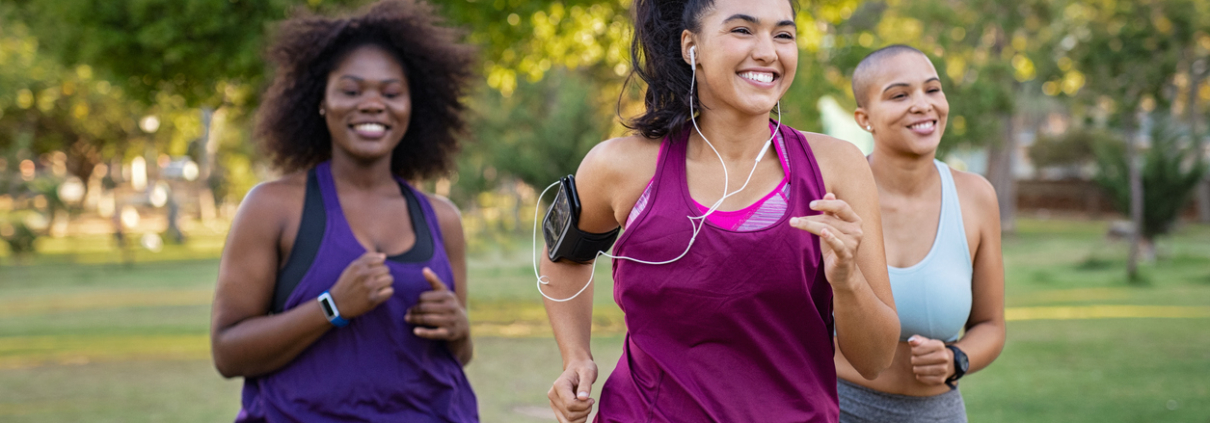Exercise and Fertility

Exercise may already be a part of your everyday lifestyle. Most adults need both aerobic activity and strength training for overall health. The CDC recommends 150 minutes each week of cardiovascular exercise. That can be broken into smaller blocks of time, including anything from brisk walking to running and muscle-strengthening activities two or more times per week [R] But do the guidelines change if you are trying to conceive? How does exercise impact your fertility?
Benefits of Exercise
There are many benefits of exercise, including weight management, blood sugar and insulin levels, improvement of mental health and mood, reduction of cancer risk, improved sleep, and improved sexual health, among others. [R] All of these facets can impact fertility in both men and women.
Couples who are overweight may encounter more difficulties when trying to conceive. Women with a higher BMI may experience menstrual dysfunction and anovulation, placing them at risk for lowered conception rates or infertility. [R] Increased weight in men has been associated with a lower testosterone level, poorer sperm quality, and reduced fertility as compared to men of average weight. [R] Exercise helps to increase metabolism, or how many calories you burn in a day. When combined with healthy eating, individuals may experience weight loss and lowered BMI, improving the chances of conception.
Exercise can reduce the glucose in your blood and make you more sensitive to insulin. Insulin resistance affects ovulation, fertilization, and embryo implantation, causing first trimester miscarriages and infertility. [R]
Stress hormones such as cortisol have been shown to play a role in the length of time needed for a couple to conceive successfully. [R] Cortisol also plays a role in your libido. It may sound like common sense, but having a low desire can affect your conception if you aren’t having sex within your ovulation window. Regular cardiovascular exercise was found to mitigate the health impact of psychological stress. [R]
Exercise can help to mitigate the risk of certain cancers. This is particularly true of cancers which have increased risk related to BMI, insulin sensitivity, and increased estrogen levels. [R] According to the summary of the research cited, even recreational exercise levels showed benefits in reducing colorectal and breast cancer risks.
Adequate sleep is necessary for maintaining optimal health. Irregular sleep patterns might adversely affect the hormone secretion impacting ovulatory cycles. The hormone disruption could additionally contribute to “insulin resistance and glucose intolerance potentially contributing to infertility and early pregnancy loss, particularly among women with PCOS.” [R] Exercise appears to have a positive correlation to sleep, especially in middle-aged and older adults. Regular exercise was found to have moderate and strong positive effects on overall sleep quality. In contrast, chronic exercise appeared to increase the total sleep time and sleep efficiency to some degree. [R]
Finally, it appears exercise has a relationship to sexual health, including increased sexual drive, sexual activity, and sexual satisfaction. Obesity and inactivity have some relationship to sexual dysfunction, and in males, a high BMI can correlate to erectile dysfunction. [R] Among both men and women, moderate amounts of exercise appeared to stimulate sexual interest and behavior. [R] However, too much activity was associated with a decrease in testosterone, and other male hormones, which may decrease sexual desire [R]. Libido in men is dependent both on testosterone levels and on psychological factors
Exercise and Fertility
While it can be acknowledged that physical activity benefits overall health and well-being, does exercise specifically relate to fertility health?
Lack of exercise or inadequate amounts of physical activity may result in health complications such as increased BMI, increased insulin resistance, and higher amounts of cortisol and estrogen in the bloodstream could affect poorer ovulation, fertilization rates, and embryo implantation. [R] In males, lack of exercise and higher BMI has been linked to a lower testosterone level, poor sperm quality, and reduced fertility compared to men of normal weight. [R]
When individuals begin exercising “too much,” it can also be counterproductive to fertility efforts as well. Studies done on both male and female athletes have shown that endurance training, such has long-distance running, has been linked to altering fertility. [R, R] In some females vigorous exercise for extended periods can be linked with anovulation which can affect fertility. [R].
There appears to be an “upper limit” of exercise, especially when working with individuals who are elite athletes. In such cases, they may benefit from working closely with their medical professionals and trainers to develop a customized plan to ensure their well-being and fertility during conception efforts and pregnancy. [R[
The yoga asanas also help to strengthen the body and improve blood flow to the reproductive organs. Some research has shown improved blood flow and circulation as it relates to a higher abdominal temperature that may correlate to enhanced fertility.
Physical activity such as yoga, pilates, and barre may be particularly helpful for fertility as the asanas, or physical poses, can bring a calming energy to the pelvis, stimulate the endocrine system and restore hormonal balance where needed. This applies to men as well as women. [R] Choosing yoga poses that target specific trigger points may help to regulate monthly cycles, improve libido, rebalance thyroid function, stabilize blood sugar, and support fertility health. To help support hormone balance, you might select poses such as fish pose, sun salutations, garland pose, mariachi’s pose, and the bound angle pose. Illustrations of these can be found here.
Women who exercise regularly prior to receiving IVF or ICSI treatment appear to benefit from physical activity and demonstrate higher success rates compared to women who are physically inactive. [R] However, your doctor may recommend you decrease exercise, depending on your health history.
To schedule a consultation with one of our fertility experts, contact us today.




